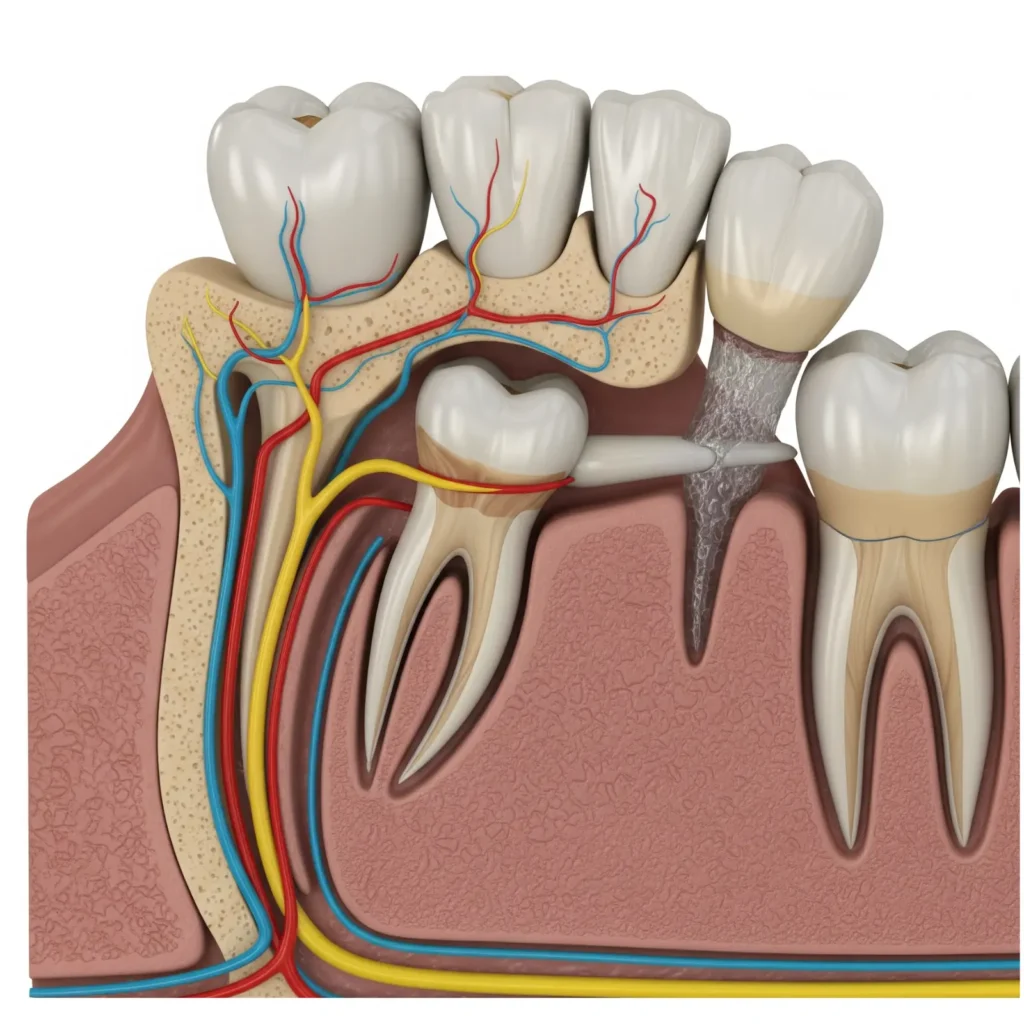Impacted teeth are a common dental condition that can lead to discomfort, infection, and other oral health issues if not addressed on time. An impacted tooth occurs when it fails to erupt properly through the gums, usually due to lack of space, improper alignment, or obstruction by other teeth.
While any tooth can become impacted, wisdom teeth and canine teeth are most frequently affected. Recognizing the symptoms and seeking prompt treatment is essential to maintaining your oral health and preventing complications.
Impacted teeth refer to teeth that are partially or completely trapped beneath the gum line. In many cases, these teeth try to emerge but are blocked by adjacent teeth, bone, or soft tissue. This often leads to swelling, pain, or infection if left untreated.
There are two types of impaction:
Impacted teeth often affect the third molars, also known as wisdom teeth, which tend to emerge between ages 17 and 25..

Impacted teeth can develop for several reasons. The most common causes include:
These factors often go unnoticed until discomfort or symptoms begin to surface.
Early detection of impacted teeth can help prevent serious dental issues. Common symptoms include:
In some cases, you may not experience noticeable symptoms at all, making regular dental check-ups vital for early diagnosis.
When left untreated, impacted teeth can cause a range of complications. These include:
That’s why dental professionals often recommend removal or monitoring of impacted teeth before complications arise.
Dentists use visual exams and digital imaging to detect impacted teeth. X-rays, panoramic Imaging like X-rays, panoramic views, or 3D scans shows the tooth’s angle, depth, and location beneath the gum surface.
Once diagnosed, your dentist will assess whether immediate treatment is necessary or if a wait-and-watch approach is more suitable.
Treatment depends on the severity of the impaction and whether symptoms are present. Here are the most common approaches:
Although you can’t always prevent teeth from becoming impacted, early detection is key to minimizing risks. You can maintain your oral health with the following tips:
For some individuals, impacted teeth may not cause immediate issues. However, it’s important to be aware that even asymptomatic cases can suddenly become problematic.
Keeping a proactive approach and staying informed about your oral health empowers you to make better decisions about treatment and prevention.
Impacted teeth aren’t just bothersome they may cause major oral health issues when left untreated.Understanding the causes, symptoms, and available treatment options can help you take control of your oral health.
Timely diagnosis and care from an experienced dental professional are essential in managing impacted teeth effectively. Whether through monitoring, surgical removal, or orthodontic guidance, treatment ensures long-term oral well-being.
Yes, gingivitis is reversible if treated early. Proper brushing, flossing, and regular dental cleanings can completely restore gum health.
With proper dental care, signs may lessen in just a few days to two weeks' time. However, treatment time varies depending on the severity of the condition.
While gingivitis itself isn’t contagious, the bacteria that cause it can be transmitted through saliva, making good hygiene important even among family members.
Yes, children and teenagers can also develop gingivitis, especially if they have poor oral hygiene or wear orthodontic appliances.
Not necessarily. Gingivitis often develops silently without pain. That’s why recognizing other signs like bleeding or swollen gums is crucial.
Hyderabad : +91 6305 971445
Anantapur: +91 70758 90089
Goa: +91 83266 32500
Mon to Sat 10:00AM to 8:00PM
Sun 10:00AM to 12:00PM

Our goal is to provide friendly, caring dentistry with the highest standards in general, cosmetic, and specialist treatments. We strive to be the best dental hospital for comprehensive oral care.
We use advanced dental technology to deliver safe, precise, and painless treatments for every patient.